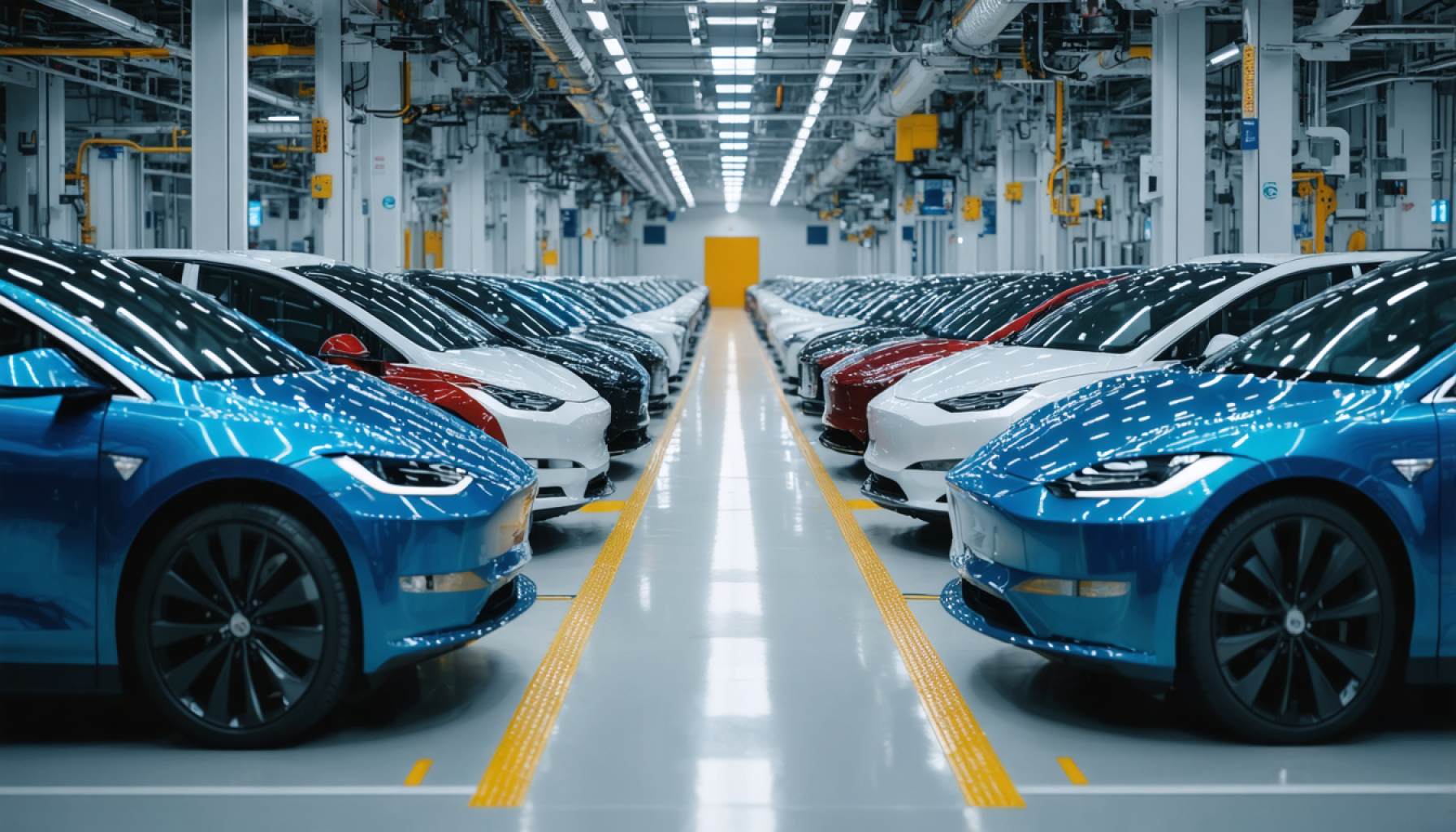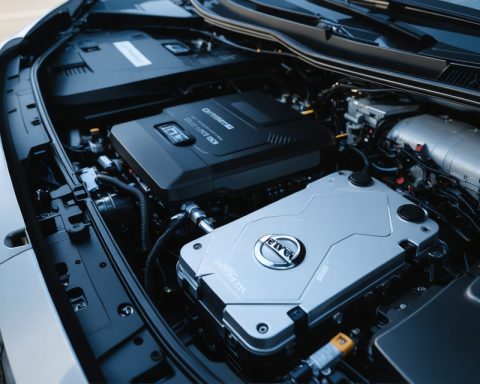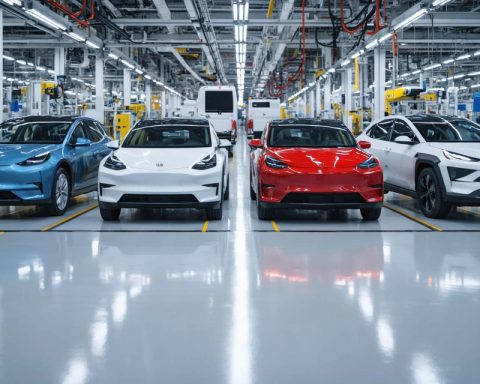- China’s EV market is experiencing turbulent growth with intense competition and pricing wars.
- The National Development and Reform Commission (NDRC) plans to enhance oversight to ensure fair competition and market stability.
- Only three EV manufacturers are currently profitable, underscoring the industry’s financial challenges.
- Unfair practices such as price slashing and misleading information will be targeted, promoting integrity and quality.
- The NDRC aims to foster a resilient ecosystem that balances rapid growth with sustainable business practices.
- The initiative reflects China’s goal to lead globally while emphasizing ethical business practices within the EV industry.
- Adapting to new regulations is crucial for companies to thrive in China’s evolving EV landscape.
Across the sprawling urban landscapes and bustling streets of China, a quiet revolution is unfolding. Glimmering electric vehicles (EVs) zip past traditional gasoline cars, painting a vibrant picture of a future driven by clean energy. Yet, beneath this futuristic facade lies a market in upheaval, teetering between explosive growth and chaotic competition.
In a decisive move to restore balance, China’s influential National Development and Reform Commission (NDRC) has vowed to intensify oversight on its burgeoning EV market. Unlike the usual tales of technological triumph, this story delves into a market struggling to find its footing amidst fierce competition and cutthroat pricing strategies. With only three EV makers currently turning a profit, the rest of the industry grapples with uncertainty.
Zheng Bei, the deputy head of the NDRC, addressed a captivated audience at the recent China EV 100 forum in Beijing. His message was clear: unfair competitive practices will no longer be tolerated. Companies that engage in reckless price slashing or the dissemination of misleading information will face consequences. The aim of this crackdown is straightforward—to create a level playing field where innovation and quality, rather than underhanded tactics, drive success.
This regulatory intervention signals a new era for the industry, urging carmakers to foster integrity and fairness. By pledging to enhance price monitoring and advocating for self-discipline among manufacturers, the NDRC is drawing a proverbial line in the sand. This is more than a policy shift; it is an attempt to harmonize the rapid growth of EV sales—forecasted to surge to 16.1 million units this year—with sustainable business practices.
The landscape Zheng describes is not without its challenges. The details of potential penalties remain cloaked in mystery, sparking both speculation and anticipation among industry insiders. Yet, the underlying message reverberates through the sector: adapt or fall behind.
While the world watches as China navigates this complex market, the strategic emphasis is on building a resilient ecosystem. The allure of electric mobility lies not just in its promise of reducing emissions but in establishing a thriving industry that marries technological advancement with ethical business practices.
In the crucible of change, China’s ambition to reign supreme in the global EV race is evident. As the country races toward a sustainable future, the key takeaway becomes crystal clear: Innovation must dance in tandem with regulation to sculpt a market that is as fair as it is revolutionary.
China’s EV Market: The Silent Revolution and What’s Next
Overview
China is experiencing a transformative period in its electric vehicle (EV) market, characterized by rapid growth and intense competition. The National Development and Reform Commission (NDRC) is stepping in to enforce fair practices, seeking to stabilize this vital sector of the future economy. Here’s a look at critical elements not fully explored in the source material.
Key Insights
Industry Trends and Market Forecasts
1. Growth Projections: The Chinese EV market is expected to grow substantially, with forecasts estimating sales could hit 16.1 million units in the near future. This explosive growth underlines the competitive nature and urgency for regulation to maintain market stability.
2. Global Impact: As the world’s largest EV market, China’s regulatory practices may set a precedent affecting global markets. International automakers are observing closely, as changes could impact global supply chains and market strategies.
3. Strategic Partnerships: Partnerships between Chinese and international EV manufacturers are likely to increase, aiming to pool resources for innovation and expansion. These collaborations could lead to advancements in battery technology and production efficiencies.
Real-World Use Cases and Technological Advancements
1. Battery Technology: Innovations in lithium-ion and solid-state battery technologies are expected to drive the next wave of advancements. Companies are focusing on increasing range and reducing charge time, pivotal factors for consumer adoption.
2. Infrastructure Development: To support the influx of EVs, China is investing heavily in charging infrastructure, with targets to vastly increase the number of fast-charging stations nationwide.
3. Smart Features and Connectivity: Integration of AI and 5G technology in EVs is becoming more common, offering real-time updates, autonomous driving capabilities, and improved safety features.
Controversies and Limitations
1. Market Saturation: With fierce competition among hundreds of EV manufacturers, market saturation becomes a concern. Many startups risk closure due to unsustainable pricing models and lack of profitability.
2. Regulatory Challenges: Clarity regarding penalties for non-compliance remains vague, causing uncertainty within the industry. Companies must navigate these regulations carefully to avoid punitive measures.
3. Environmental Concerns: While EVs promote cleaner air, challenges remain in battery disposal and resource mining, raising questions about sustainable practices beyond vehicle emissions.
Pressing Questions and Answers
– What does the NDRC’s involvement mean for consumers?
Consumers can expect better quality assurance and ethical standards in pricing and marketing. This oversight aims to protect consumer interests and promote fair competition.
– How will this affect global EV strategies?
International companies will need to align with Chinese regulations if they wish to compete, possibly influencing global market strategies and emission standards.
– Will smaller EV manufacturers survive this regulatory shift?
Smaller manufacturers might struggle unless they innovate and align with the new regulations. This creates opportunities for mergers and partnerships as survival strategies.
Actionable Recommendations
– Invest in Research and Development: Manufacturers should prioritize advancements in battery technology and autonomous driving features to stay competitive.
– Strategic Pricing Models: Focus on developing competitive yet sustainable pricing strategies that emphasize value over volume.
– Collaborative Efforts: Consider partnerships with tech companies to integrate advanced connectivity and smart features, adding value for consumers.
Conclusion
The landscape of China’s EV market is shifting. Companies that embrace regulation and innovate in battery technology, connectivity, and infrastructure will likely lead this transformation. By balancing competition with ethical practices, the industry can achieve sustainable growth, setting a precedent for global automotive trends.
For more insights on global market trends, visit Automotive News.













